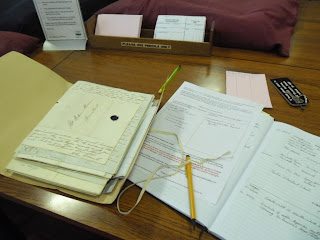This little water-colour of Bethlehem was painted in an exercise book nearly 200 years ago by 15 year old Catherine Read who used to live in Wincobank Hall, just across the road to where I live now. Maybe Catherine copied another picture drawn by one of the many well-travelled visitors to her home. Or maybe her grandfather brought back a decorated souvenir with a landscape scene. His 18th century passport, lodged in the Sheffield Archive, is a glorious colour parchment stamped and sealed in countries across the world.
Catherine's parents, John and Elizabeth Read, were energetic campaigners for social justice and religious freedom. With missionary zeal they supported campaigns to to improve the lot of the poor and they supported the Sunday School movement so that children could learn to read the Bible for themselves. But John Read died a broken man, shamed by potential bankruptcy, having bailed out his father-in-law whose iron-works had failed due to the recession following the Napoleonic Wars. His debts were cleared by his eldest daughter Mary Anne, who had married well, but been widowed early. She bought the Hall and moved back home with her baby daughter to live with her mother and sisters. Together these women were a formidable force for change.
 Earlier this year I spent days and days leafing through piles of hand written documents, old notebooks and letters, account books and wills trying to piece together the story of this extraordinary family. Catherine never married. Instead, she spent her life looking after her sister Eliza's children, many of whom were frail and died young, along with their delicate mother.
Earlier this year I spent days and days leafing through piles of hand written documents, old notebooks and letters, account books and wills trying to piece together the story of this extraordinary family. Catherine never married. Instead, she spent her life looking after her sister Eliza's children, many of whom were frail and died young, along with their delicate mother.Mary Anne, a woman ahead of her time, became well known as editor of collections of persuasive poetry and prose, essentially social propaganda. Her most notable cause was the universal abolition of slavery and in 1841 she was at the inaugural meeting of what is now Anti-Slavery International. Emily Read ran the village school at the chapel, provided hands on help and was well loved by the local families. Two of Eliza's son's survived to found the Wilson dynasty and their children went on to become Liberal and Labour politicians, continuing to campaign for improved social conditions. And all the time in the background, the fortunes of the family firm The Sheffield Smelting Company, waxed and waned with all the precariousness experienced by today's financial institutions.
Sheffield's industrial heritage owes all to the courage of the entrepreneurs who built the businesses from nothing. reinvesting their profits without a safety net, and to the workforce who invested their lives and their health. As a city, Sheffield is shaped by allegiance to the parliamentary cause dating back to the Civil War, non-conformist radical religion and the commitment of the great philanthropists of the Industrial Revolution.
There is a great story here that brings alive all that dry and dusty Victorian legislation I learned about at school, in those history lessons that were awash with dates and Prime Ministers but told nothing of the people. This is a story I want to get back into. In between everything else. And Christmas.
More of the Wincobank story is here http://upperwincobankchapel.wordpress.com/about/
The rest is in archives around the world.












